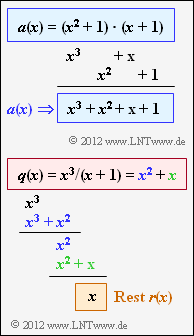Difference between revisions of "Aufgaben:Exercise 2.3Z: Polynomial Division"
From LNTwww
| Line 17: | Line 17: | ||
===Fragebogen=== | ===Fragebogen=== | ||
<quiz display=simple> | <quiz display=simple> | ||
| − | { | + | {Welches Ergebnis liefert $a(x) = (x^3 + x + 1) \cdot (x^2 + 1)$? |
|type="[]"} | |type="[]"} | ||
| − | + | + | - $a(x) = x^5 + x^3 + x^2 + 1$, |
| − | - | + | + $a(x) = x^5 + x^2 + x + 1$. |
| + | - $a(x) = x^6 + x^3 + x^2 + 1$- | ||
| − | { | + | {Welche der Polynomdivisionen ergeben keinen Rest $r(x)$? |
| − | |type=" | + | |type="[]"} |
| − | $ | + | + $(x^5 + x^2 + x + 1)/(x^3 + x + 1)$. |
| + | + $(x^5 + x^2 + x + 1)/(x^2 + 1)$, | ||
| + | - $(x^5 + x^2 + x + 1)/(x^2)$, | ||
| + | - $(x^5 + x^2 + x)/(x^2 + 1)$. | ||
| + | |||
| + | {Es sei $a(x) = x^6 + x^5 + 1$ und $p(x) = x^3 + x^2 + 1$. Bestimmen Sie $q(x)$ und $r(x)$ entsprechend der Beschreibungsgleichung $a(x) = p(x) \cdot q(x) + r(x)$. | ||
| + | |type="[]"} | ||
| + | - $q(x) = x^3 + x^2 + 1, \hspace{0.2cm} r(x) = 0$, | ||
| + | - $q(x) = x^3 + 1, \hspace{0.2cm} r(x) = 0$, | ||
| + | + $q(x) = x^3 + 1, \hspace{0.2cm} r(x) = x^2$. | ||
</quiz> | </quiz> | ||
Revision as of 16:58, 15 December 2017
In dieser Aufgabe beschäftigen wir uns mit der Multiplikation und insbesondere der Division von Polynomen im Galoisfeld $\rm GF(2)$. In der Abbildung ist jeweils die Vorgehensweise an einem einfachen und selbsterklärenden Beispiel verdeutlicht:
- Die Multiplikation der beiden Polynome $x^2 + 1$ und $x +1$ liefert das Ergebnis $a(x) = x^3 + x^2 + x + 1$.
- Die Division des Polynoms $a(x) = x^3$ durch $p(x) = x + 1$ liefert den Quotienten $q(x) = x^2 + x$ und den Rest $r(x) = x$.
- Man kann das letztere Ergebnis wie folgt überprüfen:
- $$a(x) \hspace{-0.15cm} \ = \ \hspace{-0.15cm} p(x) \cdot q(x) + r(x)\hspace{0.05cm}= $$
- $$\hspace{-0.15cm} \ = \ \hspace{-0.15cm}[(x+1) \cdot (x^2+x)] +x =$$
- $$\hspace{-0.15cm} \ = \ \hspace{-0.15cm}[x^3+ x^2+x^2+ x] +x = x^3\hspace{0.05cm}.$$
Hinweis:
- Die Aufgabe gehört zum Themengebiet des Kapitels Erweiterungskörper.
Fragebogen
Musterlösung
(1)
(2)
(3)
(4)
(5)
